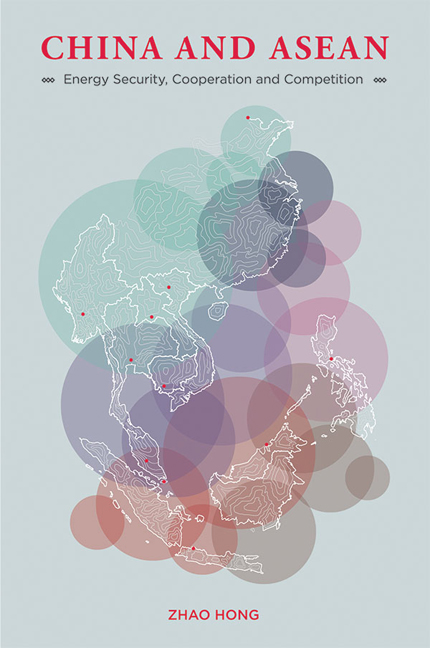Book contents
- Frontmatter
- Contents
- List of Tables and Figures
- List of Abbreviations
- Acknowledgements
- 1 Introduction: China, ASEAN, and the New Global Energy Order
- 2 Economic Growth and Energy Security
- 3 China's Energy Quest in Southeast Asia
- 4 Case Study (1): Myanmar
- 5 Case Study (2): Indonesia
- 6 Energy Resource Competition and the South China Sea Disputes
- 7 Conclusion
- Index
- About the Author
6 - Energy Resource Competition and the South China Sea Disputes
Published online by Cambridge University Press: 19 May 2017
- Frontmatter
- Contents
- List of Tables and Figures
- List of Abbreviations
- Acknowledgements
- 1 Introduction: China, ASEAN, and the New Global Energy Order
- 2 Economic Growth and Energy Security
- 3 China's Energy Quest in Southeast Asia
- 4 Case Study (1): Myanmar
- 5 Case Study (2): Indonesia
- 6 Energy Resource Competition and the South China Sea Disputes
- 7 Conclusion
- Index
- About the Author
Summary
China's search for energy resources in Southeast Asia can help deepen China–ASEAN relations in cooperative terms. It can also be a cause for possible conflicts. Rising energy prices, fears of supply scarcity, and rapid increase in oil-import dependence in China and ASEAN countries have helped drive resource nationalism among regional governments and local communities. In the South China Sea, the question of access to maritime energy resources is interlinked with national sovereignty issues, making the South China Sea disputes more complex. This chapter will try to analyse two critical questions: whether the potential energy reserves in the South China Sea has contributed to aggravating these territorial disputes and thus intensified regional suspicions of China's hegemonic ambition; or whether these potential energy reserve can instead provide a means for the parties to seek cooperative and collaborative solutions, and thus improve China– ASEAN relations.
MARITIME ENERGY RESOURCES AND THE “SOVEREIGNTY DILEMMA”
In the South China Sea, maritime energy nationalism is often tied to disputes over territorial claims and fishing rights. Maritime energy resource nationalism is exacerbated by some speculative estimates that the ocean floor is rich of energy resources. Politics, both domestic and diplomatic, supports a predilection for optimistic assessments from the claimant states. Although geographic evidence suggests that the actual prospective areas are quite small, as most of the seabed lacks the characteristics to be seriously prospective, some countries’ estimates on South China Sea resource reserves are at a high level. Some international sources have suggested that the South China Sea could be “Asia's Mediterranean”, a “new Persian Gulf ”, and leading Chinese sources give estimates of the potential oil resources that are far higher than other estimates. In November 2012, the China National Offshore Oil Corporation (CNOOC) estimated that the South China Sea held 125 billion barrels of oil (bbo) and 500 trillion cubic feet (tcf) of gas beneath the South China Sea. In January 2013, the U.S. Geographical Survey published a much lower estimate of 11 bbo in proved and probable reserves, and 190 tcf of gas in undiscovered resources.
- Type
- Chapter
- Information
- China and ASEANEnergy Security, Cooperation and Competition, pp. 168 - 201Publisher: ISEAS–Yusof Ishak InstitutePrint publication year: 2015



